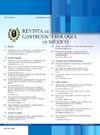Tratamiento de sobrecrecimiento bacteriano en el intestino delgado en pacientes chilenos con síndrome de intestino irritable: un estudio prospectivo y comparativo
IF 1.5
Q3 GASTROENTEROLOGY & HEPATOLOGY
引用次数: 0
Abstract
Introduction and objectives
Patients with disorders of the gut-brain axis, such as irritable bowel syndrome (IBS), often exhibit small intestinal bacterial overgrowth (SIBO). Its treatment includes rifaximin (RF), ciprofloxacin (CF), neomycin, sulfamethoxazole-trimethoprim, and metronidazole (MZ). RF is a non-absorbable antibiotic, postulated to have fewer adverse effects. Our aim was to assess symptomatic response and SIBO eradication in patients with IBS, using three antibiotic regimens.
Methods
A prospective, randomized, double-blind study was conducted on IBS patients over 18 years of age, utilizing the Rome IV questionnaire and lactulose breath test. Those diagnosed with SIBO were randomly assigned to receive antibiotic treatment. Group A was treated with RF, group B with CF, and group C with MZ, each for 10 days. Treatment response was evaluated based on the SIBO eradication rate 15 days after completing therapy, utilizing hydrogen and methane breath tests with lactulose. Self-reported symptoms were recorded on a 10-point Likert scale before, during, and after treatment.
Results
Ninety-seven patients with IBS and SIBO were included, 81% of whom completed treatment. Fifty-nine percent of the patients treated with RF achieved SIBO eradication, compared with 53% and 79% of those treated with CR and MZ, respectively. Metronidazole reduced more methane levels, compared with the other groups. However, the greatest reduction in abdominal pain and bloating was observed in the RF group, with a lower percentage of adverse events.
Conclusions
Patients with IBS and SIBO benefit from antibiotic therapy. MZ exhibited the best SIBO eradication rate, but RF demonstrated greater symptomatic improvement and a lower rate of adverse effects.
求助全文
约1分钟内获得全文
求助全文
来源期刊

Revista de Gastroenterologia de Mexico
GASTROENTEROLOGY & HEPATOLOGY-
CiteScore
1.60
自引率
12.50%
发文量
102
审稿时长
12 weeks
期刊介绍:
La Revista de Gastroenterología de México es el órgano oficial de la Asociación Mexicana de Gastroenterología. Sus espacios están abiertos a los miembros de la Asociación como a todo miembro de la comunidad médica que manifieste interés por utilizar este foro para publicar sus trabajos, cumpliendo con las políticas editoriales que a continuación se mencionan. El objetivo principal de la Revista de Gastroenterología de México, es publicar trabajos originales del amplio campo de la gastroenterología, así como proporcionar información actualizada y relevante para el área de la especialidad y áreas afines. Los trabajos científicos incluyen las áreas de Gastroenterología clínica, endoscópica, quirúrgica y pediátrica.
 求助内容:
求助内容: 应助结果提醒方式:
应助结果提醒方式:


